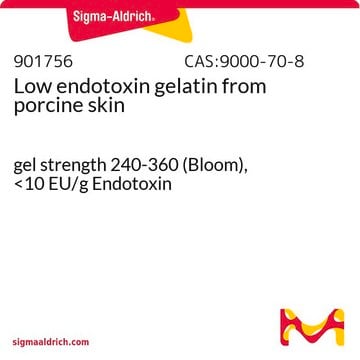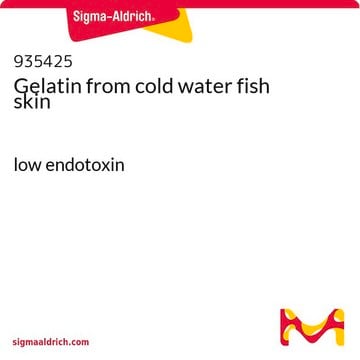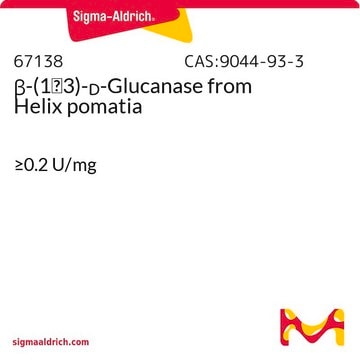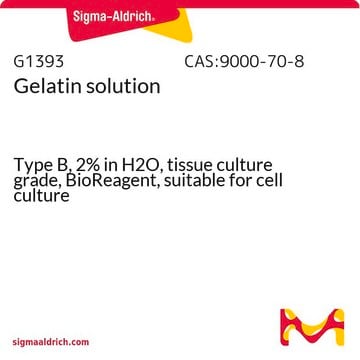901757
Low endotoxin gelatin from porcine skin
gel strength 100 (Bloom), <10 EU/g
Synonym(s):
beMatrix™ gelatin LS-W
About This Item
Recommended Products
form
powder
impurities
<10 EU/g Endotoxin
<10 EU/g
<300 g Total viable aerobic count
loss
<15% loss on drying
color
white to pale yellow
pH
5.0-6.5
viscosity
1.8-2.8 mPa.s
gel strength
80-120 (bloom)
anion traces
sulfite (SO32-): <1.5 mg/ 20 g
cation traces
As: <1 ppm
Hg: <0.1 ppm
heavy metals: <20 ppm
storage temp.
2-8°C
Looking for similar products? Visit Product Comparison Guide
Application
Legal Information
Storage Class Code
11 - Combustible Solids
WGK
nwg
Flash Point(F)
Not applicable
Flash Point(C)
Not applicable
Choose from one of the most recent versions:
Certificates of Analysis (COA)
Don't see the Right Version?
If you require a particular version, you can look up a specific certificate by the Lot or Batch number.
Already Own This Product?
Find documentation for the products that you have recently purchased in the Document Library.
Customers Also Viewed
Articles
Professor Shrike Zhang (Harvard Medical School, USA) discusses advances in 3D-bioprinted tissue models for in vitro drug testing, reviews bioink selections, and provides application examples of 3D bioprinting in tissue model biofabrication.
Professor Shrike Zhang (Harvard Medical School, USA) discusses advances in 3D-bioprinted tissue models for in vitro drug testing, reviews bioink selections, and provides application examples of 3D bioprinting in tissue model biofabrication.
Professor Shrike Zhang (Harvard Medical School, USA) discusses advances in 3D-bioprinted tissue models for in vitro drug testing, reviews bioink selections, and provides application examples of 3D bioprinting in tissue model biofabrication.
Professor Shrike Zhang (Harvard Medical School, USA) discusses advances in 3D-bioprinted tissue models for in vitro drug testing, reviews bioink selections, and provides application examples of 3D bioprinting in tissue model biofabrication.
Protocols
Frequently asked questions (FAQs) for KAPA SYBR® FAST One-Step qRT-PCR Kits.
Frequently asked questions (FAQs) for KAPA SYBR® FAST One-Step qRT-PCR Kits.
Related Content
Tissue engineering fabricates tissues cultures from scaffolds, living cells, and biologically active molecules by simulating the microenvironment of the body to repair or replace damaged tissue.
Tissue engineering fabricates tissues cultures from scaffolds, living cells, and biologically active molecules by simulating the microenvironment of the body to repair or replace damaged tissue.
Tissue engineering fabricates tissues cultures from scaffolds, living cells, and biologically active molecules by simulating the microenvironment of the body to repair or replace damaged tissue.
Tissue engineering fabricates tissues cultures from scaffolds, living cells, and biologically active molecules by simulating the microenvironment of the body to repair or replace damaged tissue.
Our team of scientists has experience in all areas of research including Life Science, Material Science, Chemical Synthesis, Chromatography, Analytical and many others.
Contact Technical Service












